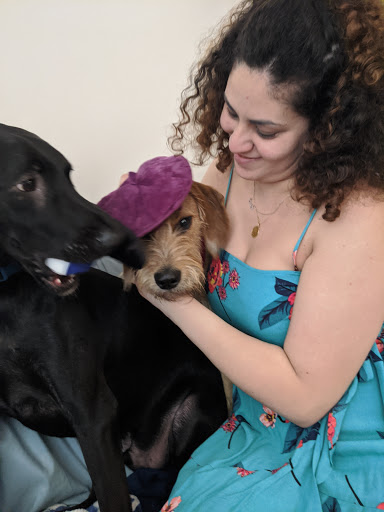Growing up in Egypt, my relationship with race and ethnicity was different.
I went to international schools and experienced life in diverse settings, regardless of my privileged background. My father, who passed when I was 13 (20 years ago), instilled values in me that guide me still.
I also believe that in Egypt, culturally, there is a different relationship with race. I think it’s due to the country’s history of colonization. I often comment to my friends here that “we were colonized by everyone” as a way of explaining how, as Egyptians, our skin tones vary from one another, and how we cover the spectrum.
I often show pictures of my family, where I have the lightest skin tone and my mom has the darkest, when I’m met with people who struggle to understand what I’m saying. Our relationship as a family is not one that was challenged due to the differences in our skin tone.
None of that is to imply that we don’t have our issues with discrimination in Egypt. Culturally, we are classist (elitist) among many other things. In my experience, racial discrimination is not one of the “big ones,” whereas discrimination based on social class is.
At one of my previous places of employment in Cairo, I was often lectured for being polite and friendly with the janitorial staff and custodians because that wasn’t the precedent the higher-ups wanted to set. At first, I was dumbfounded, then when I understood what I was hearing, I was infuriated. I was, in fact, being advised not to be kind to those from a lower socioeconomic class so “they” wouldn’t get used to it.
I ignored them and continued conducting myself in ways that were aligned with my values until I eventually quit. One of my best friends was one of our housekeepers growing up, until her passing due to breast cancer in June of 2017. I simply don’t believe in treating others differently or mistreating and other-ing people because of their socioeconomic class or racial background. It’s not something that aligns with my values.
I moved to Philadelphia in September of 2016 to start my Ph.D. program.
Everything changed.
I experienced discrimination from many, including other minorities, which horrified me because I didn’t understand it. I still don’t.
At first, it was seemingly little things that I didn’t piece together. I’d be walking in the street and strangers would pull on my curls. Some would grab a handful and be surprised that it yanked my head back and that it was, in fact, my “real” hair. I got into the habit of putting my hair up, but then decided not to change my appearance and hide my curls because others did strange things.
I was, and often still am, told by strangers that I am “ethnically exotic,” and they “don’t know where to place me.” I’ve been called the N-word many times and once while crossing the street, an older gentleman in a truck who could only see the back of my head (so really, just my curls) tried to run me over, rolled down his window and yelled “F*ck you, N-word” at me. To say I was confused would be a vast understatement. I’ve also been regularly insulted in Spanish by those who assumed I’m Latina.
I’ve learned to ignore all of this because it’s not about me, rather a reflection of those who do and say such things.
Being aware of how uncomfortable people got when I spoke in Arabic, I started using it less in public.
Now, however, I speak it anytime, anywhere, and I no longer care if it bothers others. It’s not a “me” problem. I decided not to change myself to make those who are governed by fear and ignorance comfortable in my presence. It got to the point where when I am feeling harassed in the street, I would start speaking in Arabic and use other’s fear of it to protect myself. I do it when I’m walking alone or when I’m walking my dogs.
On a professional level, I self-advocate and get in trouble for it. At times, I am labeled as difficult to work with because I push back against those who discriminate against or “other” me. In 2017, after a wrist injury that was misdiagnosed, I went back to Egypt for surgery. I now have what people refer to as a physical disability because of the limited mobility in my dominant hand. My pinkie and ring finger are bent at an angle.
I’ve had to work with people who:
>> Repeatedly told me to go back to Egypt as though my hand injury affects my intellect.
>> Knew about my injuries and told me to “leave my trauma at the door.”
>> Regularly discussed my accommodations with others and without my consent.
>> Decided the onus was on me to make everyone else around me feel comfortable with my background.
>> Thought it appropriate to challenge my identification as North African because they think I should identify as Middle Eastern.
>> Asked me to elaborate on an experience and interrupted me mid-answer to say, “We can’t talk about that, we don’t know enough about it.”
>> Interrupted me to say, “What Alia is trying to say is…”—when it wasn’t even close to what I was trying to say. (When that happens, I tend to let people finish their correction of what I was saying and start by saying, “Actually, what I was trying to say before being interrupted is…”)
>> Told me they avoid saying my name because it is difficult.
>> Told me in a room full of people that because I am an Arabic speaker, I “evolved” differently.
>> Heard a conversation I was having with a friend, made it about them, changed the context, and went and reported me.
>> Told me I shouldn’t say “I don’t understand” when having conversations about life, for example: I don’t understand why someone would do that.
I pushed back against some of those things, not all. I stopped pushing back against some experiences, because I gave up. I grew tired and weary of continually having the same conversation. I became a broken record. I gave up.
My way of pushing back is having uncomfortable conversations where we are all held accountable for our words and actions. In some of those conversations, the push back I received was essentially being told “your face” (someone really said that when I asked how I offended them in order not do that again). In asking for elaborations as to how “my face” is a problem, I learned that people ascribed intent to my facial expressions and proceed to change how they interacted with me based on their assumptions instead of asking for clarity.
I also learned that many people don’t want to have these conversations. This type of dialogue can be a phenomenal learning opportunity for all those involved and is a great way to bring about mutual understanding. A lack of willingness to engage in this kind of dialogue—one that allows for growth and understanding—is problematic and leads to stagnation.
It’s also why I briefly gave up. I learned this after repeatedly being told that I should be more diplomatic when I expressed my feelings. I didn’t realize there was a more diplomatic way of saying “when ‘x’ happened” or “when ‘y’ said ___, I felt (invisible/silenced/ignored).” I wonder what the response would have been if I said I felt like I was on the receiving end of micro-aggression.
Earlier this month, during my virtual graduation, my name was written wrong. I’m genuinely heartbroken. Some people don’t understand why and tell me not to let this “minor thing” take away from my accomplishment.
I sent a long letter and have been informed that the error went unnoticed until my email and that they will fix it. I appreciate it; unfortunately, it does not negate the heartbreak such a careless mistake caused for myself and my family.
The misspelling of my last name as Amar instead of Ammar is further complicated by the fact that Amar means “moon” and “beauty” in Arabic. While venting to let go of my frustration, I had to deal with people who joked about it because of what Amar means, which only added to my disappointment.
I’m heartbroken. I still don’t understand it.
My name is not a minor thing.
And no, you can’t touch my hair.
~












Read 2 comments and reply